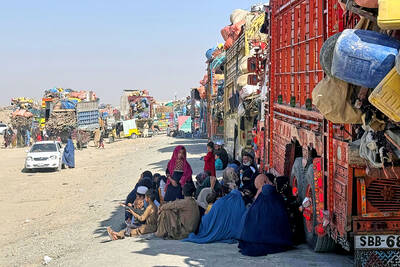Iraq’s politicians, fearing that voters have wearied of speech-making that often proves to be little more than hot air, have hired a slew of singers to woo them.
They have bought the pens of poets and the voices of performers to sing their praises on the nation’s television and radio networks ahead of tomorrow’s (Sun) vote, the second parliamentary ballot since former president Saddam Hussein was ousted in 2003.
“You alone resisted the tyrants, you are the protector of the Tigris and the Euphrates who brought back to us life and security,” goes one refrain as pictures flash across the screen of Prime Minister Nuri al-Maliki visiting schools and shaking hands.
“National Alliance, we are with you. All the people are following in your footsteps and will vote for you,” sings another choir on Al-Forat television in praise of the Iraqi National Alliance, the main Shiite religious list and a rival to Maliki’s coalition.
“Hashemi, O Hashemi, you kept the promises you made to the people,” is the song for Sunni Vice President Tareq al-Hashemi that can be heard on Al-Babyliya and other Sunni-run television stations.
“Iraqis, like all Arabs, are sentimental,” said Ahmed Mahdi, a press attache for Al-Forat television. “You can win them over with music, not with speeches.”
Musical campaigning was a godsend for many Iraqi singers, he added.
“We pay US$1,000 a song but often the poets and singers work for free because they can get exposure on television or because they believe it is important to get people to vote,” he said.
Salah Abdel Ghafour, a 57-year-old poet and singer and one of the best paid of the batch, insists his work backs no political party but is simply a call for people to exercise their democratic rights. “In my song, I say that all the candidates’ posters are worth nothing because the best poster is that of Iraq,” he said.
Ghafour’s Oh people, take care of your Iraq is repeated throughout the day on the state-funded Al-Iraqiya channel.
Poetry, which also figures in the election campaign, is “more seductive than candidates’ speeches or invectives,” poet Karim al-Lami said.
In the multi-ethnic and multi-confessional northern city of Kirkuk, the TERT television station, run by the Turkmen minority, has called upon Turkman poet Jomhour Karkouki to provide several works.
“Kirkuk is and will remain Turkman, Kirkuk is Iraqi,” one of them says.
Turn over to the Kirkuk TV channel, a Kurdish-run station, and the viewer can hear calls for the disputed city to be annexed to Iraq’s northern Kurdistan region and for voters to plump for the Kurdistani Alliance in Sunday’s vote.
Meanwhile, Iraqis living abroad have began casting ballots. Hundreds are lining up at stations in Syria, home to the largest Iraqi expatriate community.
The UN refugee agency estimates that about 2 million Iraqis are living abroad after fleeing since the 2003 US-led invasion.
In addition to Syria, voting began yesterday in the US, Canada, Australia, Austria, Sweden, Germany, the UK, Denmark, Holland, Iran, the United Arab Emirates, Egypt, Jordan, Lebanon and Turkey. The balloting will go on for three days.

With much pomp and circumstance, Cairo is today to inaugurate the long-awaited Grand Egyptian Museum (GEM), widely presented as the crowning jewel on authorities’ efforts to overhaul the country’s vital tourism industry. With a panoramic view of the Giza pyramids plateau, the museum houses thousands of artifacts spanning more than 5,000 years of Egyptian antiquity at a whopping cost of more than US$1 billion. More than two decades in the making, the ultra-modern museum anticipates 5 million visitors annually, with never-before-seen relics on display. In the run-up to the grand opening, Egyptian media and official statements have hailed the “historic moment,” describing the

SECRETIVE SECT: Tetsuya Yamagami was said to have held a grudge against the Unification Church for bankrupting his family after his mother donated about ¥100m The gunman accused of killing former Japanese prime minister Shinzo Abe yesterday pleaded guilty, three years after the assassination in broad daylight shocked the world. The slaying forced a reckoning in a nation with little experience of gun violence, and ignited scrutiny of alleged ties between prominent conservative lawmakers and a secretive sect, the Unification Church. “Everything is true,” Tetsuya Yamagami said at a court in the western city of Nara, admitting to murdering the nation’s longest-serving leader in July 2022. The 45-year-old was led into the room by four security officials. When the judge asked him to state his name, Yamagami, who

DEADLY PREDATORS: In New South Wales, smart drumlines — anchored buoys with baited hooks — send an alert when a shark bites, allowing the sharks to be tagged High above Sydney’s beaches, drones seek one of the world’s deadliest predators, scanning for the flick of a tail, the swish of a fin or a shadow slipping through the swell. Australia’s oceans are teeming with sharks, with great whites topping the list of species that might fatally chomp a human. Undeterred, Australians flock to the sea in huge numbers — with a survey last year showing that nearly two-thirds of the population made a total of 650 million coastal visits in a single year. Many beach lovers accept the risks. When a shark killed surfer Mercury Psillakis off a northern Sydney beach last

‘NO WORKABLE SOLUTION’: An official said Pakistan engaged in the spirit of peace, but Kabul continued its ‘unabated support to terrorists opposed to Pakistan’ Pakistan yesterday said that negotiations for a lasting truce with Afghanistan had “failed to bring about a workable solution,” warning that it would take steps to protect its people. Pakistan and Afghanistan have been holding negotiations in Istanbul, Turkey, aimed at securing peace after the South Asian neighbors’ deadliest border clashes in years. The violence, which killed more than 70 people and wounded hundreds, erupted following explosions in Kabul on Oct. 9 that the Taliban authorities blamed on Pakistan. “Regrettably, the Afghan side gave no assurances, kept deviating from the core issue and resorted to blame game, deflection and ruses,” Pakistani Minister of